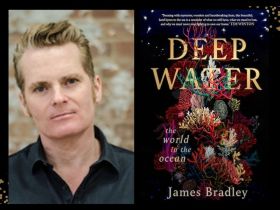Image Ken Liu. Photograph (c) Lisa Tang via Perth Writers Festival 2017.
The short story was the topic in a session called Little Magic. Facilitator Laurie Steed spoke to Ken Liu (The Paper Menagerie and Other Stories, 2011), Julie Koh (Portable Curiosities, University of Queensland Press, 2016) and Laura Elizabeth Woollett (The Love of Bad Men, Scribe Australia, 2016).
Although Liu seemed to have more to say than the others, all the contributions played off each other and meshed well.
Steed opened by asking all three if they would keep writing short stories. It was odd, then, that Liu said he will not be returning to the short story. He loves the genre, but it is hard to publish. And the short story is nothing like the novel, so there is no turning one into the other just by reducing or lengthening it; that is like blowing up a fly to the size of an elephant and expecting it to keep functioning as a fly. For instance, a short story can be without a plot, but a novel cannot.
In Woollett’s case, she was going to create a novel, but on researching the lives of the women she was writing about, she came to believe that only a group of short stories could bring out the differences and connections between the women, and mix the better-known examples with the less well known.
Koh had started out trying to write a novel about a narcissist, but it became ‘sprawling’, so she thought she would ‘practise writing by writing short stories’. That’s how her short stories came into being.
Are there some rights and wrongs of short fiction, then? Or does the short story have some malleability? Liu, who is also a lawyer, said that there is something about legal training that can help here. Take the reliance on precedent, for instance. Every example of precedent is a story in itself. From these and the facts of your case, you construct. You have to persuade and convince, so lawyers are ‘trained to tell the short story, and to do it with clarity and sharpness’. Julie added that fiction can be rational; it doesn’t have to be all emotion. She feels the short story goes well with satire, for instance.
Asked about the darker side of stories, Woollett spoke about how the essence of her writing is in bringing out the humanity of her criminals. Liu added, in praise of her work, that her stories are not about what happens next, but about how we got there and who the people are. This is what the short story is made for – psychological interiority. In his own short story, The Paper Menagerie, a character sees the paper animals as trash, not magic. This isn’t about cultural conflict, but about racism and the main character’s way of seeing his parents.
The subject of racism brought discussion around to Koh’s ‘The Three-Dimensional Yellow Man’? She referred to the allegorical nature of the story. She then told us how she had believed in childhood that she had blue eyes – so many around her had them. She spoke of how non-white writers ‘read autobiographically’ and as if not permitted to go beyond the expectations of the stereotypes: e.g. Asian women as studious and not very funny.
Among the questions from the audience was one about the tension between facts and feelings. Woollett answered that she had to be matter-of-fact about the events, but sought to strike a balance between those facts and an empathic voice.
Referring to Liu’s earlier mention of the plotless short story, one questioner wanted to know how you satisfy a reader if you don’t have a plot. For Laura, her stories do have plots, but she gives away the ending early to help readers understand that the story is ‘not that important’. Liu added that the interest of the short story is not the plot but getting to know the characters better. He also spoke about the way plot is perceived in the short story, the novel and the novella. For him, the main distinction is that the short story does not have to be plot-driven at all, the novel requires multiple plot lines and intersecting characters, and the modern novella can do without all that and tends to keep to one unifying plot.
Occasionally, replies followed tangents that left us wishing for more in response to the question asked, but all the participants lent something to our understanding of the short story and how, as a genre, it can take shape in the mind of the writer.
Rating: 3 1/2 stars out of 5
Little Magic: featuring Ken Liu, Julie Koh and Laura Elizabeth Woollett
Speakers: Laurie Steed talks to Ken Lie, Julie Koh and Laura Elizabeth Woollett
Murdoch Lecture Theatre
Sunday 26 February 2017 11.30am
PIAF 2017





